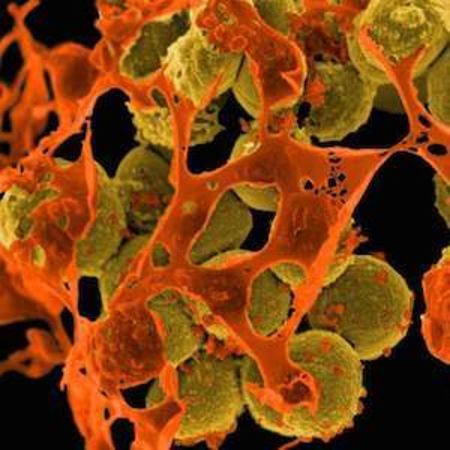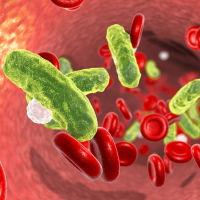Chlorhexidine baths in the ICU do not cause high levels of resistance in bacteria on patients’ skin, according to a study published in Infection Control & Hospital Epidemiology.
The retrospective cohort study of patients admitted to the Barnes-Jewish Hospital ICU in St. Louis, Missouri from 2005 through 2012 included more than 500 randomly selected isolates of MRSA from surveillance cultures to determine drug resistance. The prevalence of CHG-resistant MRSA isolates fell from 6.2 percent in the year chlorhexidine bathing began to zero to 1.5 percent from 2006 to 2009. The prevalence spiked to 16.9 percent in 2009 and 2010 before subsiding to 4.6 and 7.7 percent in 2011 and 2012. The researchers attribute increased prevalence at certain points to patients admitted to the ICU already colonised with MRSA prior to chlorhexidine exposure.
David Warren, MD, MPH, lead author of the study and Associate Professor of Medicine in the Division of Infectious Diseases at Washington University School of Medicine and Hospital Epidemiologist at Barnes-Jewish Hospital in St. Louis, observed: "There has been concern in the healthcare community about the impact of routine, daily chlorhexidine (CHG) bathing on fostering the spread of bacteria resistant to this agent. We did not see sustained increase in MRSA resistant to CHG.”
See Also: Findings Do Not Support Chlorhexidine Bathing in ICUs
However, other studies have conflicting findings, and Derek Angus wrote in JAMA in 2015 that “the largest benefit appears to be in settings where the baseline prevalence of multidrug-resistant organisms is high. In these settings, the same benefits potentially could be gained through other approaches, such as improved hand hygiene, which may be safer and less likely to affect the ecology of bacterial resistance in the ICU.”
Image credit: Wikimedia Commons
The retrospective cohort study of patients admitted to the Barnes-Jewish Hospital ICU in St. Louis, Missouri from 2005 through 2012 included more than 500 randomly selected isolates of MRSA from surveillance cultures to determine drug resistance. The prevalence of CHG-resistant MRSA isolates fell from 6.2 percent in the year chlorhexidine bathing began to zero to 1.5 percent from 2006 to 2009. The prevalence spiked to 16.9 percent in 2009 and 2010 before subsiding to 4.6 and 7.7 percent in 2011 and 2012. The researchers attribute increased prevalence at certain points to patients admitted to the ICU already colonised with MRSA prior to chlorhexidine exposure.
David Warren, MD, MPH, lead author of the study and Associate Professor of Medicine in the Division of Infectious Diseases at Washington University School of Medicine and Hospital Epidemiologist at Barnes-Jewish Hospital in St. Louis, observed: "There has been concern in the healthcare community about the impact of routine, daily chlorhexidine (CHG) bathing on fostering the spread of bacteria resistant to this agent. We did not see sustained increase in MRSA resistant to CHG.”
See Also: Findings Do Not Support Chlorhexidine Bathing in ICUs
However, other studies have conflicting findings, and Derek Angus wrote in JAMA in 2015 that “the largest benefit appears to be in settings where the baseline prevalence of multidrug-resistant organisms is high. In these settings, the same benefits potentially could be gained through other approaches, such as improved hand hygiene, which may be safer and less likely to affect the ecology of bacterial resistance in the ICU.”
Image credit: Wikimedia Commons
References:
Warren DK, Prager M, Munigala S et al.(2016) Prevalence of qacA/B Genes and mupirocin resistance among methicillin-resistant staphylococcus aureus (MRSA) isolates in the setting of chlorhexidine bathing without mupirocin. Infect Control Hosp Epidemiol, Feb 2: 1-8. [Epub ahead of
print]
Latest Articles
MRSA, Chlorhexidine
Study: Chlorhexidine Baths Did Not Increase Resistant MRSA


























